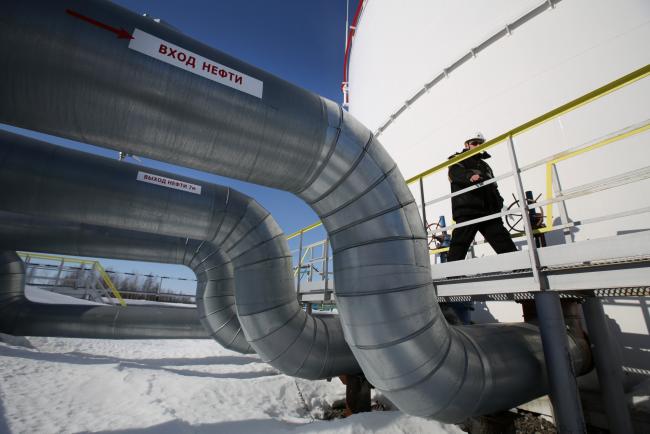(Bloomberg) -- Russia’s deal with OPEC on crude supply is starting to look straightforward -- when compared with looming decisions on how taxes will be levied on the nation’s oil industry into the next decade.
The Duma, or lower house of parliament, will start discussing legislation on Thursday which aims to finally move the tax burden for Russian oil producers to the point of production rather than export, ending years of wrangling. The government now appears to be moving up a gear in pushing through tax changes, prompted partly by protests over surging gasoline costs after international crude prices rose to multi-year highs.
The changes in the oil industry, which have become known as the tax maneuver, are also part of a wider fiscal overhaul aimed at boosting economic growth and increasing revenue. The plans will alter the long-standing system of charges relating to the provision of crude to refineries in Belarus and Kazakhstan which currently costs Russia about 140 billion rubles ($2.2 billion) annually. The changes are now expected to take place over the next six years.
Russian government officials have become increasingly vocal about rising pump prices in recent weeks, mirroring a wave of state intervention in retail fuel that has swept from Latin America to India. Newly appointed Russian Deputy Prime Minister Dmitry Kozak secured a freeze in gasoline prices and touted the possibility of increased export taxes on the motor fuel to secure domestic supply. Looking to the longer term, lawmakers will now consider tax incentives to boost the production of gasoline, while measures to raise export duties or cap pump prices will only be looked at on an ad hoc basis, rather than as a main feature of the proposals.
In addition to stimulating gasoline output, oil producers will be granted tax relief to alleviate concerns that the planned gradual increase in the extraction tax from the start of 2019 until 2024 will push up the cost of crude. Companies including state-run Rosneft PJSC, which could suffer from a drop in refining margins as crude costs rise, are expected to be compensated, depending on how much gasoline-processing capacity they have and also whether they are subject to international sanctions. Russia will also seek to introduce a ratio in the excise tax formula to cap increases in domestic fuel prices if global crude prices spike.
Russian export duties and extraction taxes currently equate to between 60 percent and 65 percent of oil prices and that will remain roughly the same with the proposed changes, said Denis Borisov, a director at the Ernst & Young Oil and Gas Center in Moscow.
The crude export duty will be abolished in 2024, a year before the scheduled end to tariffs between Russia, Belarus and Kazakhstan under plans for a wider customs agreement. There is currently a disparity in the levy on crude shipped to Belarus and the subsequent supply of fuels back to Russia. The government will also retain the right to reintroduce the levy if crude prices increase above certain limits.
There’s still little clarity on how the plan would affect every single Russian oil producer as some of the formulas are yet to be expanded, said Alexander Kornilov, an analyst at Aton LLC in Moscow. “And practice shows that even the most detailed of Russia’s schemes for oil taxes -- its key source of budget revenue -- are often adjusted and re-adjusted after adoption.”
